- Home
- Jason McIntyre
Dread (Dovetail Cove, 1978) (Dovetail Cove Series) Page 5
Dread (Dovetail Cove, 1978) (Dovetail Cove Series) Read online
Page 5
So Doc Sawbones' office had remained here. Active patient records had mostly been moved over, but older patient files—for those who didn’t have regular checkups—had been kept here. Deceased files hadn’t been sorted or moved to the hospital’s record rooms. Doc told me he was charged a dollar a year for rent, just so the town had something to put in the books. Hanging on to health records was comped by town council as a necessary public expense. Doc explained it to me in a much more confusing way as we trod through the dark rooms and wove our way around metal and wooden file cabinets.
The blinds were drawn. Even with mid-morning upon us and the light of day full and bright out there on Main, it was blacks and greys inside the closed-up doctor’s office. I wondered if anyone was paying a power bill. Doc used another key on his jangling ring to open a steel box filled with even more key rings. He took one of those rings from the lock box and moved into an adjacent room. I followed and flicked the light on. He quickly shut it off. “I’m not actually supposed to be in here,” he said and took a flashlight from a desk drawer. I rolled my eyes when he moved away and wouldn’t notice. He had me hold the flickering light for him and started with a set of green file cabinets labeled ‘M-N' after he found the right key.
He leaned my Ma’s cane in a corner so he could use both hands to paw through nearly all the thick folders in those four drawers before giving up. “Nuh,” he said after fussing with me to hold the torch just so. He sat in an old wooden office chair that squeaked with his weight.
“Not here?” I said.
“No, it’s got to be here. Somewheres, I think.” Doc was out of breath and sweating. Even in this light there was a shine on his forehead and a heavy breath between his words. “Just...we had separate files for autopsies and I wonder if ol’ Moorty’s general file found its way into that pile. Could be there’s been another autopsy in the last couple years. Someone mighta taken the whole stack of autopsy files over. If that’s the case, we'll have a harder job getting a look at them.”
He leaned forward and reached into his back pocket for a wrinkled hanky.
“Got your pills?” I asked.
He wiped his face with a shaky hand. “Yuh. Got ‘em. No problemo, there. I’ll just sit a spell. And then we'll move to the next room.”
“I could look. And you could rest,” I said.
He looked at me indignantly. “Just two minutes, young feller. Everyone’s always in such a goddamned hurry nowadays. You wouldn’t even know where to look. I’ll be right as rain in two minutes—”
We both jumped at a noise in the darkness. I swung the beam of the flashlight at the doorway, my chest giving a thud. The movement made the torch short. It flickered then went out, sending us back to darkness. I slapped the light with an open palm and cursed it under my breath.
Someone had come in the front door and I heard approaching footfalls outside the file room. I didn’t notice if Doc had locked the door behind us when we’d come in.
I kept shaking the flashlight, slapped it and finally it came to life again. I half expected its beam would fall on the leather-skinned naked man in the dark doorway. But it didn’t. The beam showed Mac’s face and he squinted back from it, shielding himself with a hand. “Jeezus, Dave. You wanna blind me with that?”
He stepped in and flicked on the light. “Why we in the dark, boys? Someone think they’re in Marathon Man?” Mac laughed. “Guess what, Dave. Dustin Hoffman, you ain’t.”
I shrugged at him, and pointed at Doc Sawbones breathing heavy in his chair behind me, as if to say the clandestine darkness was his idea. Mac took my meaning and gave me a look in return as if he understood. He said, “Figure anything out?”
“Not yet,” Doc said. “Help me up and we'll go next door.” He grabbed for Ma’s cane and reached out for my arm. “And turn off the light, wouldja? We don’t need to advertise we’re in here.”
5.
We finally found a stack of folders in another room.
Franklin W. Moort, b. August 13, 1914, d. June 14, 1972.
We spread the photos out on the empty surface of an old desk and Mac convinced Doc to let us turn on one of the desk lamps. It threw light across the pictures and we all leaned over them, shoulder to shoulder.
We studied them in silence. Like men who’d searched out lost treasure their whole lives suddenly speechless at the discovery of something else, something bigger, something not imagined when thoughts of all that gold and jewels had started them on the journey.
Here was a different sort of find. One that made no sense.
My brother and I looked at each other when we came across the set of a dozen head shots taken during Frank Moort’s autopsy. Some showed profiles, some an uncomfortable up-close zoom, a few of the cadaver’s head and shoulders. The skull was clean and bald, just like Doc had said. The skin was washed out and grey. The photos had been snapped and printed in colour, though. I could tell because some patches of flesh wept stark red.
It was the man who’d been in Ma’s pantry, the well-endowed guy who’d shouted in an animal voice then threw the kitchen table as if it was only a losing hand of gin rummy.
I was as close to certain as I could be, but couldn’t be a hundred percent sure because we couldn’t see Frank Moort’s eyes in these. As if reading my mind, Doc flipped through the stack and found another colour photo. In it, the cadaver’s eyes stared blankly, lids held artificially wide with small pieces of clear tape. I hadn’t been affected by seeing the photos, not until this one, with its eyes peeled open and staring into the camera’s lens. I’d been much more affected by seeing Ma in her box yesterday morning. Even in her dress and with the makeup, Ma had looked bloated and unreal, not like the best version of herself but, instead, like a version from another world, an alternate reality where she didn’t pray to a myth in the clouds twenty times a day, and where she ate three proper meals and didn’t have that hardened scowl on her face.
As for Frank’s photos, he’d been untouched by the hand of a funeral reconstruction expert. His eyes didn’t have the vacant look in them I expected. You could see something in them still, as if he’d died only a moment before the flash bulb struck and there was still a shadow of him, swimming behind those eyes.
I didn’t like what I saw when I looked at that picture. It reminded me of the last time I’d seen him, in the days after Da died, coming round to the house with his wife and a casserole dish, offering us his sorrow. Those eyes looked at me the same as they did in a memory I’d not revisited in over twenty years. Those eyes. Those eyes.
Now I was sure. It was him. It had been Frank Moort in the kitchen.
And I felt Mac and the Doc tense with understanding too.
We all knew it. But we all knew it was impossible at the same time.
Heart scrabbling in my chest, breath heavy with the weight of knowledge, I pawed through the stacks for more photos and found all the shots of the body before incisions. No eagle tattoo on the chest. And I was sure of that too. The intruder’s was just like Da’s—spread wing tip to wing tip, base of each shoulder to the other. Nothing on Frank’s sagging pectorals. Not even the wiry, grey chest hair I’d have expected to find on a man his age. And you wouldn’t miss a piece of art that big on a man’s bare chest. I flipped the photo over. Typed out on the back was Frank Moort’s name and case number, just like all the rest. It was no mis-file. I checked the other typed sheets and saw that Frank was 178 pounds at the time of the photos. His age was fifty-eight and his height was only 5' 10“. The man in the kitchen seemed taller but then my heart was yammering at the time and I had felt threatened. He may have been a midget for all the good a set of eyes would do me in a standoff like that. I knew that adrenaline made memory faulty. Memory is the trickiest friend anyone can have, even when a heartbeat is steady and the sweat glands are on vacation.
The intruder had seemed, what, younger, too? Bigger and more muscular than the fifty-eight-year-old-desk jockey in these photos. Moort had a gut. I didn’t think the intruder ha
d. He was slimmer around the middle. I remember—or I thought I remembered—because I took note of his disproportioned manhood directly below his belly. And the purple birthmark! As much as I didn’t want to look at another man that way, I wanted to find shots of the cadaver’s down below. I needed to see if Frank Moort had a large purple birthmark in the fold at the top of his left leg before the undercut of his stomach.
We hunted through the stacks, scattering them across the desk. I didn’t find shots below the waist yet but did find a few showing the back of the corpse. More colour in those, maybe because the blood had settled down that way if the body had been found on its back.
There was the second tattoo: the air force one with the naked woman and her big round tits on the side of the B-24 bomber and “Liberty for all!” in orange lettering. Doc held a sheet of paper from the file into the light. A type-written heading read, MEDICAL HISTORY in all capital letters. I skimmed the section below and read bits and pieces. Served in second world war, Air Force, leg injury sustained in combat. Family history of cancer, diabetes, late-onset dementia. Smoker.
I avoided lingering on any of the pictures taken after incisions began. The remainder recorded a gruesome ordeal: gloved hands holding back flaps of skin, pools of red poured into ceramic reservoirs at the edge of the medical examiner’s table, so many organs sliced to show their decay in profile. One photo showed the cadaver’s chest peeled wide open, a thick bloody edge where a Y-shape had opened up the major cavities of poor, deceased Franklin Moort.
I looked away, bile threatening to come up the tube of my throat, stomach acid leaving a burn way in the back.
I had to push through. More photographs. Frank Moort’s pubic area wasn’t dark. He had no body hair at all, like he’d been shaved clean. It may have been dark down there once upon a time, but not at fifty-eight. Not in June of ‘72 when Doc’s counterparts from the mainland had come over to get a look at his insides after neighbours found him without most of his teeth. The body didn’t show a single hair in any of these photographs.
I looked at the next one. It was a further pan down the corpse’s waist. No purple birthmark. And his manhood wasn’t nearly as pronounced as God had seen fit to endow the man in the kitchen. Nowhere near. Sight of that penis in the kitchen would make even the highest-paid porn actor tingle with envy.
Finally, I broke our vocal silence.
“Where are the scars?”
Beside me, Doc cleared his throat. On my other side, Mac said, “What scars?”
“If this was the guy in Ma’s kitchen...where are the scars from this incision right down his middle?” No one answered. We all stared down at the scatter of photos, me at the one with the gaping red hole of organs under his chest. “Even if he got Da’s war tattoo inked after, there aren’t any scars. He’d a been covered in a big Y-shaped line.”
6.
So it was him and it wasn’t him. Frank Moort must have had a brother—or a doppelgänger. I asked Doc Sawbones about that possibility on our way back out of the old office into a blinding light of late-morning sun. He said nothing at first, only considered.
The sky was a fall shade but the heat had come up. Only a sparse beard of white cloud hung at the horizon, just touching the tops of the buildings on Main Street. Above, a handful of gulls circled and cried at each other. Any fisher knew it meant a bloody animal in the wake or more rain soon. Out on the street, another trio of them fought each other over a french fry sleeve marked with the Harvey’s Diner logo.
We waited for a half ton to slosh past, its wheels half-covered by the puddles, then we walked diagonally across the road and popped into Harlow’s Grocer, where a boy was up a ladder hanging a long orange Halloween banner. Zeke picked up trash with a poking stick most days and today he was using his poker, alternating it with a long-handled coal shovel to clear sewer drains and ease the drainage of standing water along Main Street’s shoulder. He was wearing tall black rubber boots and I heard the siphoning of water at his feet. I said, “Hi Zeke,” as we passed him but he just stopped what he was doing, pushed his thick dirty glasses up his nose and blinked at me. He went back to work as we left him. It sounded like he was muttering to himself. Storm-a-comin gotta-git-the-water-gone. Storm-a-comin gotta-git-the-water-gone—
At Harlow’s, bags of pretzels and six-packs of Coca-Cola were on sale for thirty-nine cents each. Tonight was Game six of the Series—the famous rematch of the Yanks at Dodger Stadium. After a run of three wins in a row, smart money was on the Yankees again this year and most TVs on the island would be tuned in to see who would take it. If the Yanks took tonight’s, that would be four games to two and there’d be no Game Seven. Same as last October if I recalled.
We bought three soda pops from the cooler for a dime apiece, popped their caps on the bottle opener, made small talk with Mr. Harlow about the return of the rain tonight, then headed back out of the busy store into sunshine. Doc had to sit and rest again so we took up the park bench outside Harlow’s, Doc in the middle. We watched Zeke and the boy up the ladder hanging the banner. Once Doc had his breath, he spoke, but he still dragged in long noisy sounds through his hairy nostrils.
“May Y’be in heaven before the devil knows you’re dead,” Doc said, raising his bottle. We all clinked the necks of ours.
“Sláinte!” Mac and I said, nearly at the same time.
“Frankie Moort had no brothers. No sisters neither,” Doc finally said, jiggling his Orange Crush and staring down into the mouth of his glass bottle at the fizz it made. “One sister who died in infancy in 1919. One brother, died in the war. No kids. He and Caroline split before we found him face up in all that...oozing. Birksie said the cops in Seattle talked to her about it, but there had been no wrongdoings, according to him and his deputy. So they weren’t officially looking for anyone.”
Mac took a swig of his root beer. He was staring off at the Radio Centre across the street where someone had lifted a colour TV and a Hi-Fi this last week. “It doesn’t make sense, Doc. It’s ludicrous. How does a guy crawl out of the ground, get himself a tattoo and meander over to Lannen to eat up Ma’s tinned preserves?”
Doc turned to face Mac and looked him right in the eyes.
“Thing is, Mac. We never put him in the ground.”
7.
You’re good boys for coming home and getting yer Ma’s things in order, the funeral, the house. Now I don’t mean nothin’ by your sister. She likely has her own reasons for not coming back. You've had some tough breaks, all three of ya.
But Frank Moort wasn’t as lucky as your Ma. No children—least none that lived. And no family by the time we found the poor sucker staring at his bedroom ceiling. We reached out to Caroline but she wanted nothing to do with the funeral. She told us to take the expenses out of the estate and she’d take the rest after the lawyers all bit off their piece of it. Seemed pretty blasé about it. Berksie, he even told me once, “That’s how you know a spouse isn’t guilty of any untoward behaviour. The guilty ones moan and bawl. After thirty-some years of marriage, most are surprised but a little relieved.”
And FrankieMoort’s wife, she’d already left him. I heard that relief in her voice when I talked with her long distance on the town’s dime.
Union Rail management stepped up and paid too. Business-folk in town, they donated flowers n’ food n’ booze. Moort was big time in this town and there was no shortage of people ready to pay up.
Lemme change gears here for just a minute, explain it so it makes some sense. So’s you remember, boys, before I...inherited...the job, the DC coroner was old Dougie Weekes. You remember him? He lived up north of the creek and he liked to be able to walk home for lunch and take in a nap before heading back in the af'noons. So he had himself a new Coroner’s office built in...oh musta been ‘56 or ‘57—same year the new clinic was built. He had his druthers and his druthers was a separate office from the clinic, even though it’d been in the old hospital since God knows. Anyway, Dougie Weekes, he’s long dead now and I
was in charge in ‘72. That office of his was where those uppity-ups snapped those pitchers. I was Coroner by then and on hand but stayed out in the office part while them mainland experts did their worst, sliced him up but good. When they finished up, I took ‘em all back to town for a lobster dinner and red wine at the Highliner. Wanted to show ‘em we weren’t just hicks. We could live the good life out here just as good as they do back east.
After, I’d had a bit too much wine and probably shouldn’t have driven. It was past dark and I’d just got them boys on the last ferry back. I headed back to the office, ‘cross that Peabody Bridge. Wanted to just get the paperwork done on Moort and get him out of that ice and back in the cold storage drawer.
The basement held our examination rooms and I headed down, flicking on the lights as I went. Nearly tumbled right down that skinny stairwell; it was so hot and I don’t mind telling you both I was more than a little drunk. I considered just forgetting it and heading home to bed but I knew Cobb would be by in the morning to get Moorty’s body first thing. Agnes was still with me then, but in a bad way.
Mighta been better for everyone if I’d a just turned tail and headed home...
Yeah, like I say, that summer was hot and dry. The caked and cracked earth gave nothing but crops dead on the stalk that year. But it was a bit cooler down there in the exam room. Cool enough for the cadaver on its bed of icepacks.
I finished up the report, put the rolls of film in envelopes to get developed, and then headed into the exam room. I got Moort hosed down and off the table, back on to his drawer but I was winded—I’ve been a big man most of my adult life and, well, I like the rich food and drink a bit much. I don’t mind admitting. I took a break from the heavy work and realized a headache was coming on. I swept up the spent film packages and scraps of paper with a broom—them boys finished the report but damn, they was messy! And so I was just about to put it away and take care of zipping up ol’ Moorty and stow him back in the drawer when I heard this awful whooshing sound. It came up like a gust of wind, but so much louder. And this jerking movement under the floor tiles. Felt like something big was under the concrete and trying to bust right up into the room. The lights flicked and it gave me such a start, I whipped around to see if there was someone standing behind me. Well the broom handle musta struck the low-hanging light. It burst and I was sprayed with a shower of hot glass and thrown into near black. Thought I was having a heart attack. I fell flat on my face, scraped myself up real good. And my cheek lay next to the drain in the green floor tile. There was this kinda heavy gurgle down in it, like a vat of motor oil cooking to a boil. And then this rumble. Something was coming up that pipe. I can tell you now, I was scared as hell. I didn’t expect the boogeyman or nothin’. Maybe raw sewage or creek water but there was this awful heft down in my belly. Like something was coming. Like I didn’t want to stick around and wait for whatever it was to show up. And if it was piss and shit I didn’t want to be laying in it either. I got up faster than a man my size and age should be able and I headed for the only light left—the crack behind the door that led to the stairway up and out of the exam room basement.

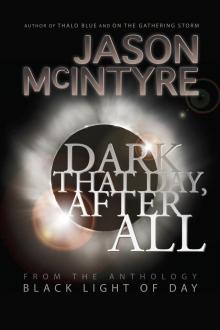 Dark That Day, After All
Dark That Day, After All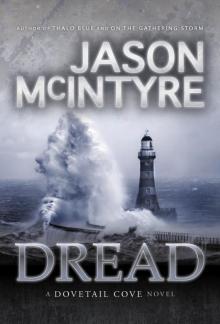 Dread
Dread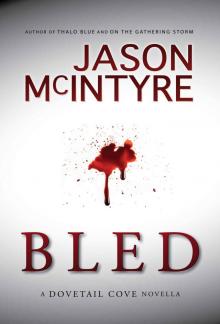 Bled
Bled Instead
Instead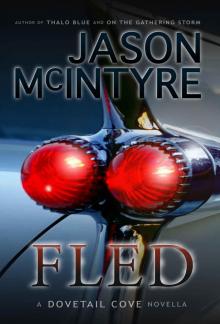 Fled
Fled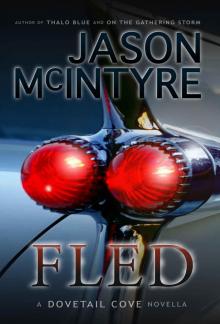 Fled (Dovetail Cove, 1973) (Dovetail Cove Series)
Fled (Dovetail Cove, 1973) (Dovetail Cove Series)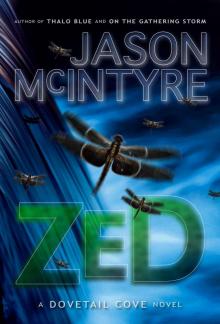 Zed
Zed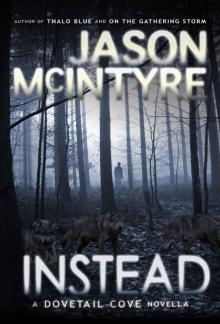 Instead (Dovetail Cove, 1979) (Dovetail Cove Series)
Instead (Dovetail Cove, 1979) (Dovetail Cove Series)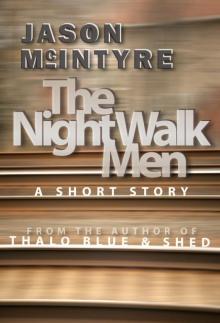 The Night Walk Men
The Night Walk Men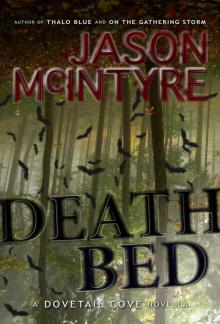 Deathbed (Dovetail Cove, 1971) (Dovetail Cove Series)
Deathbed (Dovetail Cove, 1971) (Dovetail Cove Series)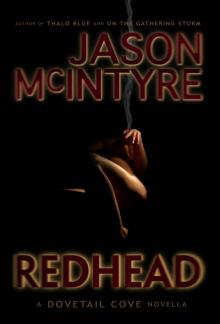 Redhead (Dovetail Cove, 1974) (Dovetail Cove Series)
Redhead (Dovetail Cove, 1974) (Dovetail Cove Series)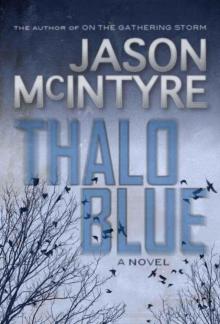 Thalo Blue
Thalo Blue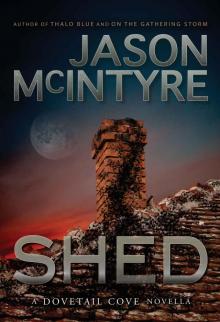 Shed
Shed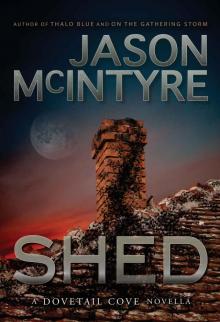 Shed (Dovetail Cove, 1977) (Dovetail Cove Series)
Shed (Dovetail Cove, 1977) (Dovetail Cove Series)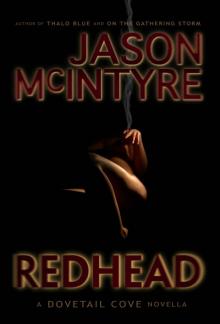 Redhead
Redhead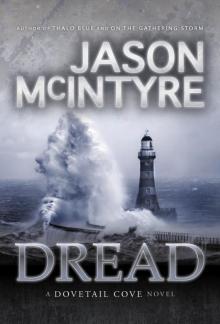 Dread (Dovetail Cove, 1978) (Dovetail Cove Series)
Dread (Dovetail Cove, 1978) (Dovetail Cove Series)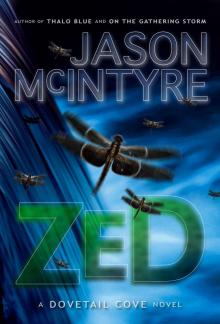 Zed (Dovetail Cove, 1975) (Dovetail Cove Series)
Zed (Dovetail Cove, 1975) (Dovetail Cove Series)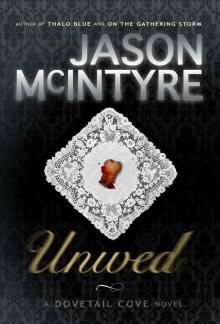 Unwed (Dovetail Cove, 1976) (Dovetail Cove Series)
Unwed (Dovetail Cove, 1976) (Dovetail Cove Series)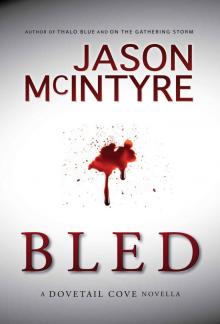 Bled (Dovetail Cove, 1972) (Dovetail Cove Series)
Bled (Dovetail Cove, 1972) (Dovetail Cove Series)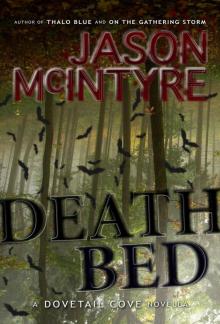 Deathbed
Deathbed